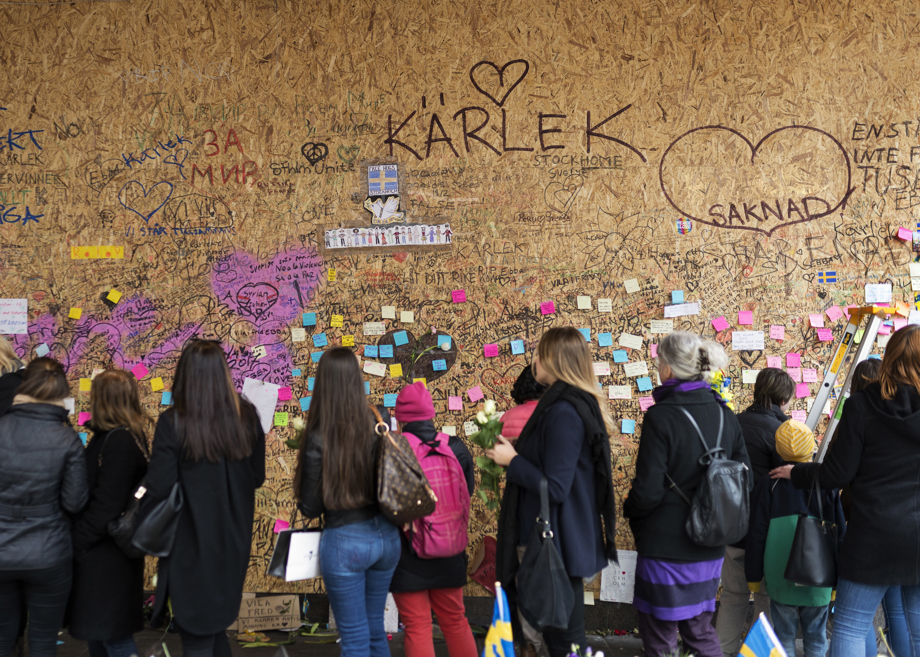Reactions following a terrorist crime
This section contains information about reactions to serious incidents. These reactions are influenced by individual circumstances and experiences, but may also be due to factors that have to do with the incident itself, such as its extent and whether it put you or others in mortal danger.
It is common and natural for a person to have a reaction in connection with terrible and frightening events, especially if they made you fear for your own life. People’s reactions vary a great deal – we are all different, and some of us react strongly while others do not. There is no right or wrong type of reaction.
Even if you yourself were not in or near the location of the incident, it can still feel frightening, particularly if the crime occurred in a place you know well and often visit.

Important to know about reactions
Many people who experience a serious incident such as a terrorist crime don’t know beforehand how they will, or may, react to it. If you know something about the kinds of reactions people can have after serious incidents, it can make it easier to deal with and accept the reactions that you or those close to you have when such an event has occurred. It’s therefore a good idea if people close to you – such as family, friends and colleagues – also read the information in this brochure, so they can give you support in a good way.
Not everyone who experiences a serious incident suffers negative consequences, and not everyone becomes traumatised. Many people who experience serious incidents cope with it by themselves, with the support of those closest to them, and do not develop stress-related disorders or illnesses. Not everyone needs or wants professional support, but it’s important to know that the option exists.
Examples of reactions
A serious incident such as a terrorist crime can trigger an acute stress reaction. This can be an extreme physical or mental strain, but most often it’s an ordinary and passing reaction. It often arises during or shortly after the trauma, and is characterised by an altered sense of reality. This is sometimes described as an inner emptiness or an emotional numbness. Reactions like these usually subside within a few days.
Some physical symptoms that are common in connection with an acute stress reaction:
- palpitations
- raised blood pressure
- sweating
- trembling
- nausea
- tension in the neck or back
- stomach or intestinal problems.
Some people react with very strong emotions, such as by crying or expressing fear and anger, while others may appear calm.
Some examples of mental reactions:
- confusion
- difficulties remembering what happened
- frustration
- depression or dejection
- lack of motivation
- unwillingness to be in public places and suspicion about meeting other people.
For some people it can be difficult to deal with the fact that they survived and are unharmed, while others did not. This can produce a sense of guilt, and make it hard to feel relieved that you survived. It can lead to thoughts such as: What would have happened if I had intervened, or done something differently? Remember that as a victim you bear no blame for what happened.
Reactions following a terrorist attack may be strong and long-lasting, for various reasons. Don’t delay seeking professional help. You can turn to your family doctor, medical care centre or company health care service. Ask someone close to you to help if it feels difficult to contact care and support services yourself.
What can you do to feel better?
How long it takes to process a serious incident such as a terrorist crime varies greatly from person to person. Your own needs determine what you need to do in order to be able to process the incident and begin to feel better, but there are a few things you can try in order to facilitate processing.
- Physical activity is a good way of reducing inner stress
- Many people find that returning to work as soon as possible helps, but it may be sensible to lower expectations and demands on yourself and your work capacity for a while
- Writing down your recollections of what happened, and your thoughts, can be helpful.
Share the incident with others
Many people find that talking to other people they feel comfortable with helps. This might be friends, family, colleagues or other important people close to them. It may also be particularly helpful to share your experience with others who were there when the incident happened – this can increase your sense of affinity and make it easier to make yourself understood. Going over the course of events can also give you a better sense of what happened, and may prevent mental images and memories from recurring in a way they otherwise might have.
It can feel unpleasant to think about or return to the location where the incident happened, but it can be helpful to do so – ideally together with people you feel comfortable with. This can be a way of processing the incident and of moving on. Memorial services can also help you process the incident.
Regionalt kunskapscentrum för kris och katastrofpsykologi (the Regional Knowledge Centre for Crisis and Disaster Psychology) at Region Stockholm has compiled information for people who have experienced a serious incident. There is also the brochure If you have experienced a serious incident, which can be ordered and downloaded.
The organisation Save the Children has produced material on psychological first aid for children who have been through something frightening and ended up in an acute crisis.